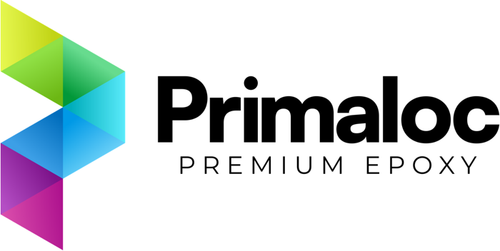Epoxy resin is renowned for its robust durability and striking aesthetic qualities, making it a popular choice for finishing surfaces that see a lot of use, such as bar tops, tabletops, and countertops. It's also versatile enough to be applied to furniture items like benches and chairs.
Beyond its functional uses, epoxy resin holds a special place in the world of art. Artists of any skill level frequently use epoxy resin to create stunning pieces, drawn to its visual appeal and the depth it adds to their work, leveraging its properties for artistic rather than purely practical purposes.
For those contemplating the use of epoxy for a countertop finish or embarking on a resin art endeavor, it helps to have a comprehensive understanding of what epoxy can and cannot endure.
In this Primaloc Answers post, we'll explore the resilience of epoxy finishes, analyzing its capacity to resist various forms of damage, such as dents, cuts, and scratches, while also highlighting how it's a preferred choice for both utility and beauty.
Do Epoxy Countertops Scratch Easily?
No, they, don't. In fact, epoxy's scratch resistance is one of its primary features.
Scratch-Resistant, Though Not Scratch-Proof
Epoxy resin is highly resistant to scratches, but it's not completely scratch-proof. While epoxy provides a hard, protective surface once cured, its susceptibility to scratching can vary based on the formula, the thickness of the application, and the conditions it's exposed to.
This durability extends to deliberate actions like sanding. Due to epoxy's toughness, manual sanding can be labor-intensive and less effective. Therefore, when correcting imperfections or achieving a matte finish on an epoxy surface, the use of power sanders is advised to efficiently smooth the area.
How Is Sanding Affected By Epoxy's High Scratch Resistance?
Sanding involves using sandpaper, an abrasive material, to either smooth or roughen surfaces through a series of abrasive actions, which naturally bring it into conflict with epoxy's resistance to scratching.
Nonetheless, sanding plays a critical role in preparing an epoxy surface for an additional layers. This is due to epoxy's inherently smooth finish. Existing layers typically need a light sanding to facilitate stronger bonds for subsequent layers.
Given epoxy's resistance to scratches, manual sanding can be challenging and labor-intensive, particularly over large areas like countertops. That's why, for efficient and uniform sanding, the use of an electric sander, especially an orbital sander, is advisable. Orbital sanders are recommended for their effectiveness and ease of use, even for novices, ensuring a well-prepared surface for further epoxy application.
The Quality of the Epoxy Matters Most
In general, standard epoxy resin finishes are resistant to minor scratches and abrasions, especially when compared to softer materials. However, under heavy use or when exposed to sharp objects, epoxy surfaces can be scratched. The degree of resistance also depends on the specific type of epoxy used; some formulations are designed to be more durable and scratch-resistant than others.
For environments where a high level of durability is required, such as commercial bar tops or heavily used countertops, choosing a high-performance epoxy designed for such applications can help minimize scratching.
Our Primaloc Bar & Table Top Epoxy is a premium-grade epoxy resin the features heavy scratch resistance while maintaining high visual clarity.
So How Strong Is Epoxy Resin?
Epoxy resin stands out for its exceptional resilience, not just against scratched, but also against almost any form of physical damage. This makes it an excellent choice for countertop finishes.
It excels in guarding against various types of damage, a trait that is particularly pronounced in high-quality resins such as our Primaloc Bar & Table Top Epoxy. Premium variants such as this are able to cure to a harder finish compared to standard resins, offering better protection and extending the lifespan of countertops remarkably.
Epoxy, the Ideal Countertop Finish
Epoxy resin is an exceptional choice for countertop finishes, renowned for its ease of application, cost-effectiveness, and its transformation into a solid, glasslike surface upon curing.
Beyond its resistance to scratches, top-tier epoxy resin provides a plethora of additional advantages, including:
-
Exceptional impact resistance: Premium epoxy products, such as our Primaloc Bar & Table Top Epoxy, offer outstanding durability and strength.
-
Superior moisture resistance: Being waterproof, epoxy resin offers excellent protection against water, humidity, and various other forms of moisture, making it a fantastic finish for preserving different materials.
- Ease of maintenance: Epoxy surfaces are straightforward to clean and maintain, ensuring longevity. With basic care, our Primaloc Bar & Table Top Epoxy can remain in prime condition for at least 7 years.
Shopping for Epoxy—What to Be Wary Of
While epoxy resin is inherently robust when correctly formulated, not every manufacturer adheres to the highest standards. The makeup of an epoxy resin significantly influences its overall quality.
In the current market, numerous manufacturers opt to reduce costs by using inferior ingredients and fillers, thereby diminishing the product's quality to offer it at an attractively low price.
When selecting epoxy resin, especially for something as vital as countertops, it's crucial to choose a product that will endure throughout its expected lifespan. Only high-quality resins, such as our Primaloc Bar & Table Top Epoxy, are designed to meet such demands.
Prioritizing quality over cost can lead to long-term savings by reducing the need for frequent repairs or refinishing. By steering clear of budget epoxy brands, you invest in durability and reliability, ensuring that your project remains pristine with minimal maintenance, bringing you less stress and greater peace of mind.
Primaloc Epoxy: Premium Epoxy for Premium Results
When it comes to epoxy resin, Primaloc Epoxy gets the job done. Our epoxy resin is premium-grade, with high performance in every category.
Epoxy resin can be beautiful, strong, and long-lasting—which is why you shouldn't compromise on quality. With Primaloc Epoxy Resin, you get the ultimate finish in durability and visual appeal.
Protect your surfaces by giving them a rock-solid epoxy finish. Choose strong. Choose reliable. Choose Primaloc.





